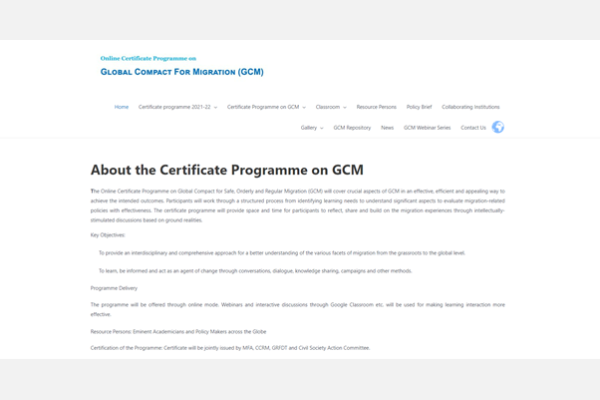Repository of Practices

Certificate Programme on Global Compact for Migration
Dates
Type of practice
Geographic scope
Geographic Scope:
Summary
The practice is a response to the limited awareness and knowledge of the Global Compact for Migration as well as the critical elements embedded in its objectives. Spearheaded by civil society, the organisations saw this as an opportunity to socialise the importance of the GCM to the public and interested parties in the migration governance and diaspora engagement space. In parallel, it provides an opportunity for participants to bring in their lived local experiences and realities in discussions shaped around regional and global platforms. Since Sept 2020, the co-organisers have offered this FREE online certificate programme (6 months) on the Global Compact for Migration. Now training a second cohort or intake, the certificate programme has cumulatively attracted nearly 500 students signing up from over 50 countries. It is conducted through special lectures and a GCM review Webinar series of 23 weekly sessions of thought-provoking dialogue and discussions. The webinars break down the 23 GCM objectives with experts, policymakers, academic speakers and migrant workers from CSOs, private sector, international organisations, governments, UN agencies and other development partners. From the first intake, around 120 students from 30 countries successfully completed the certificate programme and graduated following assessment and participation in the taught lectures and webinar series. The thematic areas included topics under migration and diaspora (theory and methodology), Global Compact for Migration and project work. The 23 webinars focus on progress at the global level of each of the 23 GCM objectives, with an unpacking of the experiences in various localities or settings of the implementation of the GCM which often exposes the global-local disconnections while proposing options for filling gaps. The idea is to bring across new thoughts and reflections in light of developments around the globe on migration, including the impact of the COVID pandemic and the regional reviews of the GCM as well as to ignite new thinking around the possibilities for reform and reshaping of GCM at the upcoming IMRF. Open to students and the general public, the webinars and lectures audiences are a mix of migration students and experts from civil society, government, academia, international organisations, among others attracting on average 120+ participants to the weekly sessions. Through the weekly multi-stakeholder moderated webinars, we have hosted on the panels over 120 experts and officials from various UN agencies, civil society organisations, migrant organisations, international NGOs, academia and migrants to share their reflections and experiences on the relevant objectives. The students have been taught topical units through lecturers and resource persons from universities, think-tanks and organisations based in Africa, Americas, Europe, Asia and the Pacific. This activity facilitated the birth of the People’s Migration Challenge (below).
Organizations
Main Implementing Organization(s)
Partner/Donor Organizations
Benefit and Impact
The first convocation ceremony for the 120 graduates was held in April 2021, inaugurated by the late Ambassador William Lacy Swing - former DG of IOM. Students shared their feedback and expressed their satisfaction from the various elements of the programme and its undertaking. Students expressed the need for more opportunities to engage with diverse speakers from the migration and development space.
In formulating the second and ongoing course, the organisers were informed by the internal evaluation from the students, feedback from experts and academic scholars as well as drawing on the contextual discourse from the migration community through the People Migration Challenge.
Key Lessons
Recommendations(if the practice is to be replicated)
Innovation
The undertaking of the certificate programme was instrumental in shaping the People’s Migration Challenge (PMC), an initiative that is an extended and inclusive global civil society mobilization process to reflect and highlight people's migration challenges from the ground and bring to light civil society's ambitious interpretation around the five identified priority areas.
The PMC continues to feed into and inspire the selection of panelists and perspectives to explore under the certificate programme. As an ongoing initiative, the PMC will need the GCM training to be scalable and sustainable.
Additional Resources
Media
GCM Objectives
Additional Images
Date submitted:
Disclaimer: The content of this practice reflects the views of the implementers and does not necessarily reflect the views of the United Nations, the United Nations Network on Migration, and its members.
More Related Practices:
- Kenya GCM Implementation Plan (2023-2027)
- Evaluando el Pacto Mundial para la Migración Segura, Ordenada y Regular: Propuesta de Indicadores de la Sociedad Civil
- Regional Migrant Response Plan (MRP) for the Horn of Africa and Yemen
- Regional Inter-Agency Coordination Platform for Refugees and Migrants from Venezuela (R4V)
- Media as a tool of advocacy and supporting mechanism
Peer Reviewer Feedback:
*References to Kosovo shall be understood to be in the context of United Nations Security Council resolution 1244 (1999).
Newsletter
Subscribe to our newsletter.
